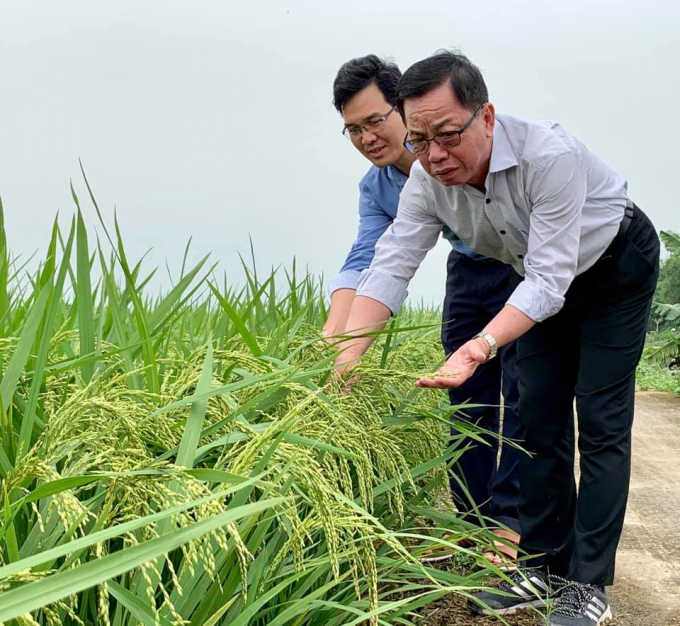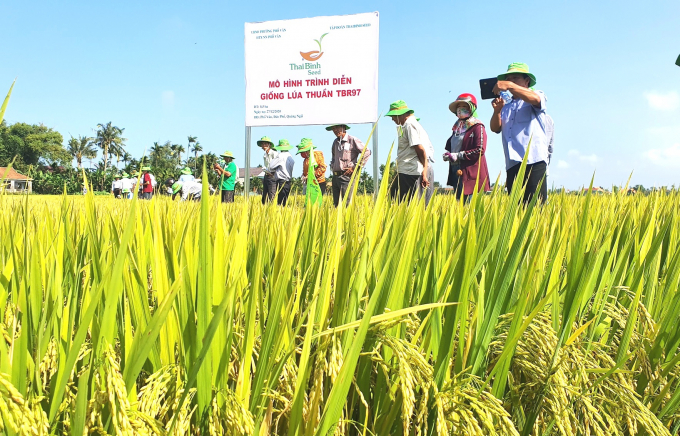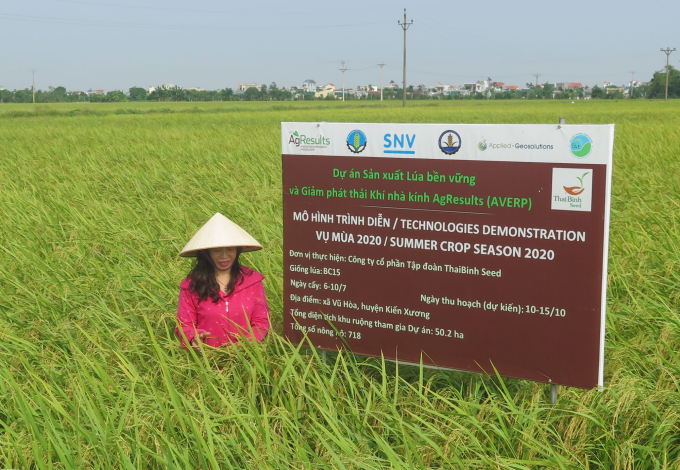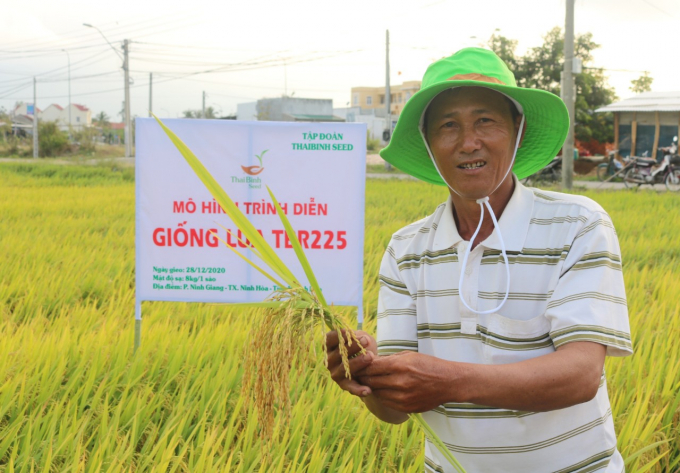June 16, 2025 | 20:46 GMT +7
June 16, 2025 | 20:46 GMT +7
Hotline: 0913.378.918
June 16, 2025 | 20:46 GMT +7
Hotline: 0913.378.918
Earlier, at the AgResults Vietnam Emissions Reduction Challenge Project (AVERP) Final Dissemination Workshop and Grand Awarding Ceremony online co-organized byCrop Production Department (under the MARD),SNV Netherlands Development Organisation and Thai Binh Provincial People’s Committee on August 25,ThaiBinh Seed Corporation (ThaiBinh Seed) was awarded the first prize worth US$750,000 for its technological solutions on sustainable rice cultivation, reducing greenhouse gas emissions during the implementation of AVERP project.

Tran Manh Bao, Chairman - CEO of ThaiBinh Seed visits a rice field. Photo:TL.
The second prize worth US$400,000 was given to An Dinh Technology Development and Investment Company Limited. The third prize worth US$200,000 was awarded to Food plant and rations plant institute plant seed join-stock company
This is a worthy reward for tireless contributions and efforts of ThaiBinh Seed in particular and participating organizations in general when the project was actually implemented.
According to SNV, Thai Binh is the only province in Vietnam selected by the Project Management Board to implement EVERP project during five-year period (from 2016 to 2021). The project was conducted in two phases. Participating organizations would be paid based on their achieved results.
The project aimed to develop, test, and scale up innovative rice farming technologies for reducing greenhouse gas emissions in rice production, contributing to improving livelihoods for smallholder farmers, protecting environment and coping with climate change.
The project was conducted in a completely new manner: "results-based prize incentives" which meant participating individuals and organizations would not be paid in advance but they were selected, evaluated and awarded based on their solutions, innovative technologies that reduce greenhouse gas emissions and improve livelihoods for smallholder rice farmers.
In addition to the dual benefits of economic development, environment protection and strengthening linkages in the value chain of rice production, verified results also helped form policies to engage the private sector in transferring technologies, implementing and scaling-up sustainable rice farming technologies in the Red River Delta, and Vietnam more broadly
Sharing about the success of the technological solutions ThaiBinh Seed deployed in the project, Tran Thi Tiec, ThaiBinh Seed's Secretary in charge of AEVRP project said that as a prestigious business in manufacturing and trading seeds, the relationships and connection between the company with cooperatives and farming households are solid. Therefore, ThaiBinh Seed has many advantages when expanding the project in 2019 and 2020 (four consecutive growing seasons).

ThaiBinh Seed always focuses on the solutions for sustainable rice production. Photo: TL.
However, to achieve success as today ThaiBinh Seed defined clearly right from the start that rice cultivation process should be strictly complied. In addition, the company always listened to farmers very carefully to understand them, providing technical support, going with them to solve the problems one by one.
Accordingly, ThaiBinh Seed’s competition sites selected were the sites the company produce rice seeds, thus, rice farming households were helped with 50% of the costs of inputs such as fertilizers, products for straw treatment post-harvest . Besides, the company bought all paddy rice from farmers at high prices (value of 1kg seed rice is 1.3 times higher than commercial rice); thereby improving incomes for smallholder farmers, motivating them to proactively participate in the project.
During four consecutive cropping seasons implementing the project, ThaiBinh Seed’s Board of Management worked with the cooperatives to produce rice seeds for the company and bring benefits to farmers.
Tran Thanh Son, Director of Binh Dinh Cooperative in Kien Xuong district, Thai Binh province, a member participating in the project, shared: Today, most of farmers were aware of the negative impacts of climate change on agricultural production and life. Therefore, when the project was implemented, rice farming households were eager to participate.
Moreover, the technological process for sustainable rice production and reducing greenhouse gas emissions became easy to apply with the instructions of agricultural experts. As long as paying attention any farmer could do. Realizing that growing rice in AVERP project was more efficient than rice cultivation using traditional practices, more and more households participated in the project.

ThaiBinh Seed’s technologies demonstration in Vu Hoa commune, KienXuong district. Photo: TL.
Apart from advantages, there were a great number of problems ThaiBinh Seed had to solve when participating in the project in which changing bad farming habits was the most difficult thing.
According to Tran Thi Tiec, because of novel approaches, at first many farmers hesitated to participate. It was the first time the new technologies had been applied in rice production, the results were not verified, and hence it was hard to persuade farmers to expand production area. For example, participating farmers must applied fertilizer once a cropping season instead of 3 times a cropping season as before. The use of fertilizers was reduced significantly. However, at first, farmers were worried that the rice plants wouldn’t have enough nutrients to grow and the yield would be low.
The new process required farmers to drain off the water in the field three times a cropping season while with the old farming practices, farmers did not drain off the water (some areas were naturally dry, some areas were flooded during the cropping season). Therefore, it was not easy to ask farmers to drain off the water when applying the new approach.
The irrigation system of the cooperatives was unreasonable in terms of irrigation and drainage. The field surface was not flat, thus, the process of draining off the water did cover all part of the field. The rice growing fields of and out of the project were interspersed together which made water control difficult.
With a lot of efforts, ThaiBinh Seed’s technology package for sustainable rice production and greenhouse gas emission reduction demonstrated many advantages such as reducing carbon dioxide (CO2) by 5.13 - 54.38%, increasing rice yield by 11.98 - 93.66% compared to the control fields. 63.2- 81.1% of participating farming households understood the novel approach.

ThaiBinh Seed will continue to spread the spirit of responsible and sustainable rice production across the country. Photo:TL.
To gain that impressive achievement, ThaiBinh Seed together with the cooperatives and small household farmers closely followed the project's criteria such as green house gas emission: 20% of score; the number of participants using technologies: 40% of score.
With the prize awarded, ThaiBinh Seed shared the reward with participants on the spirit "Working together, coming in for fruits together". More specifically, 10% coming out of the reward were given to cooperatives and farming households including 5% for cooperatives and 5% for smallholder farmers.
According to statistics, the company spent a total expense of VND7.8 billion to help farmers and cooperatives with agricultural materials like fertilizer, products for straw treatment as well as paying prize money to participating farmers in the project in four consecutive cropping seasons.
"After the project ended, on the basis of results obtained, ThaiBinh Seed will continue cooperate with the cooperatives and smallholder farmers to promote the application of the technological package on a large scale in the next crops towards sustainable rice production, reducing greenhouse gas emissions, protecting environment and creating long-term livelihoods for farmers," ThaiBinh Seed's project secretary Tran Thi Tiec said.
Translated by Mai Tham
/2025/06/12/3721-2-202745_83.jpg)
(VAN) TH made an impression at Seoul Food 2025 with its line of natural beverages, paving the way for Vietnamese food products to enter the South Korean market.

(VAN) Soc Trang's success in rice exports stems from a strategy of developing fragrant and specialty rice cultivation areas and standardizing production toward low-emission practices.
/2025/06/11/1311-5-120811_839.jpg)
(VAN) The pig farming industry is facing the challenge of comprehensive restructuring to meet requirements for quality, safety, traceability, and market expansion both domestically and for export.

(VAN) Vietnam considers participating in ALGROALBA in order to expand agricultural production, coordinate the assessment and effective exploitation potential land.
/2025/06/05/5314-1-184727_407.jpg)
(VAN) From seemingly worthless fish scales and skin, enzymes and lactic ferments can transform by-products into peptides, opening a sustainable, effective business direction and elevating Vietnamese seafood.

(VAN) TTC AgriS and IFC signed a strategic partnership to develop a sustainable agricultural value chain, aiming to achieve the Net Zero target by 2035.

(VAN) Seafood by-products are opening a new path, combining green growth and technological innovation to enhance the industry's value.